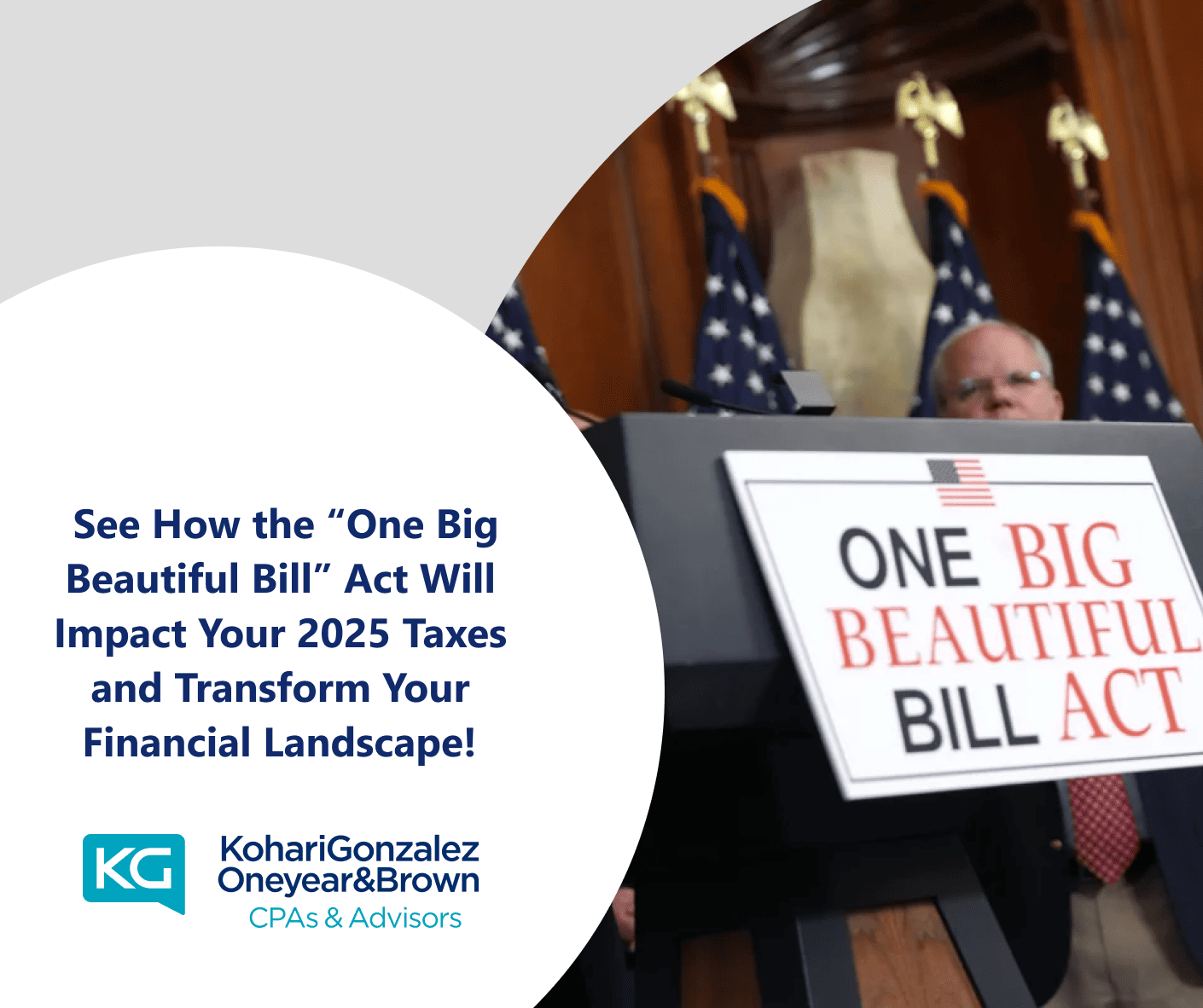
Article Highlights:
- Standard Deduction Increase
- Special Temporary Deduction for Seniors
- Child Tax Credit
- Qualified Small Business Stock (QSBS) Exemption
- New Deduction for Tips
- Overtime Deduction
- Deduction for Car Loan Interest
- Adoption Credit
- 529 Savings Plan Enhancements
- Bonus Depreciation
- Qualified Production Property Special Depreciation Allowance
- Third-Party Network Transaction Reporting (1099-Ks)
- Termination of Previously Owned Clean Vehicle Credit
- Termination of Clean Vehicle Credit
- Termination of Commercial Clean Vehicle Credit
- Termination of Alternative Fuel Vehicle Refueling Property Credit
- Termination of Energy Efficient Home Improvement Credit
- Termination of Solar Energy Credit
- Domestic Research Expenditures
- SALT Deduction Changes
On July 4th, the President signed into law the so-called "One Big Beautiful Bill" Act (OBBBA), a crucial piece of legislation that ushers in a slew of tax provisions aimed at taxpayers across the board. Though the act includes measures that go beyond this year, our focus here is on changes that will take effect in 2025, which are important for taxpayers to be aware of. As you go through the list of changes, examine whether any of them may relate to your financial situation and whether any necessary steps need to be taken before the end of the year. Particularly pressing are the several environmental tax credits that will expire at the end of the year (some soon), requiring people who wish to claim these benefits to act quickly. This guide will provide you with the knowledge you need to effectively optimise your tax duties and benefits in the middle of legal changes.
Here is a thorough explanation of the tax law amendments outlined in the OBBBA that will take effect in 2025.
1. Standard Deduction Increase : Beginning in 2025, the standard deduction will be increased to $15,750 for singles and married couples filing separately, $23,625 for heads of households, and $31,500 for married couples filing jointly. These deductions will be adjusted for inflation in future years.
2. Special Temporary Deduction for Seniors: Individuals 65 and older will receive a $6,000 ($12,000 for a married couple if both qualify) deduction, as long as their modified adjusted gross income (MAGI) does not exceed $75,000 for singles or $150,000 for joint filers. This replaces the no-tax idea for Social Security that was proposed during the presidential campaign. The deduction is available regardless of whether you receive Social Security benefits, and it applies to both itemisers and non-itemizers. This deduction will apply from 2025 to 2028 and will not replace the increased standard deduction available to people 65 and older.
3. Child Tax Credit: The nonrefundable child tax credit will be increased to $2,200 per kid. The income levels for phasing out the credit will be $400,000 for joint filers and $200,000 for others. To qualify, both the child and the parent(s) must have Social Security numbers (SSNs).
4. Qualified Small Business Stock (QSBS) Exemption: For QSBS acquired after July 4, 2025, a tiered gain exclusion will apply, with a 50% exclusion when the stock is sold after three years, a 75% exclusion after four years, and a 100% exclusion after five years. This only applies to C Corporations and imposes limitations on the amount that can be excluded. Contact this office for more information and to determine whether your company qualifies.
5. New Deduction for Tips: Tips received in occupations that typically get tips are eligible for a deduction, which is capped at $25,000 per year. Individuals having an adjusted gross income (AGI) of more than $150,000 or $300,000 for joint filers have their deduction decreased by $100 for every $1,000 over the AGI level. Furthermore, this deduction is not available to those employed in certain service professions or enterprises, such as health, law, accounting, actuarial science, performing arts, consulting, athletics, financial services, broking services, and so on. The IRS will issue a list of qualified occupations by October 2, 2025. This deduction is available just until 2028. A valid Social Security number is necessary for the return, and married taxpayers must file jointly. Employees who are qualified for this deduction may want to amend their federal income tax withholding, while qualifying self-employed persons may be able to adjust their anticipated tax payments to reflect this deduction.
6. Overtime Deduction: This above-the-line deduction lets employees to deduct the part of their overtime pay that exceeds their usual pay rate from their taxable income. The deduction amount, like the tip deduction, is decreased by $100 for every $1,000 in modified adjusted gross income that exceeds $150,000 ($300,000 for joint returns). This deduction is available just until 2028. Employers must specify acceptable overtime income on Form W-2 or other statements as required by the IRS. Like the tip deduction, married taxpayers can only take the overtime deduction if they submit a joint return. All persons must include a legitimate Social Security number on their returns.
7. Deduction for Car Loan Interest: Taxpayers can deduct up to $10,000 in interest for loans secured by a first lien used to acquire autos made in the United States. Available from 2025 until 2028. Like the tip and overtime deductions, this deduction is being phased away for higher-income taxpayers. The deduction begins to phase out for single taxpayers with a modified adjusted gross income (MAGI) of more than $100,000 and married couples filing jointly with more than $200,000. The phaseout is $200 for every $1,000 (or portion thereof) of MAGI that surpasses the threshold. This deduction is available to both itemisers and non-itemizers. Lenders and other beneficiaries of qualifying interest must file information returns with the IRS and provide taxpayers with statements detailing the total amount of interest received during the taxable year. To claim the deduction, taxpayers must submit the vehicle's VIN (vehicle identifying number) on their return.
8. The Adoption Credit, which was previously non-refundable and simply reduced a taxpayer's tax liability, will become partially refundable up to $5,000 from 2025 to 2028.
9. 529 Savings Plan Enhancements: Tax-free distributions from 529 plans can now be used for additional educational expenses, such as elementary, secondary, or home school expenses, up to $20,000 (up from $10,000 previously) for distributions made after July 4, 2025 (the date the legislation was enacted). Eligible expenses now include qualified postsecondary credentialing fees associated with recognised postsecondary credential programs and recognised postsecondary certifications.
10. Bonus Depreciation: The 100% bonus depreciation deduction for qualifying business property acquired after January 19, 2025, has been reinstated and made permanent.
11.Qualified Production Property Special Depreciation Allowance: Taxpayers can instantly deduct 100% of the cost of some new factories, modifications to existing factories, and other facilities that would typically be 39-year property. This provision permits taxpayers to deduct 100% of the adjusted basis of qualified producing property in the year it is placed into operation. Construction on the site must commence after January 19, 2025, but before January 1, 2029, and it must be operational by January 1, 2031.
12. Third-Party Network Transaction Reporting (1099-Ks): For transactions facilitated by third-party networks, such as payment processors or platforms, Form 1099-K reporting is required only if the gross amount of the transactions exceeds $20,000 and there are more than 200 transactions in a calendar year. This restores the threshold to what it was before being reduced to $600.
13. Termination of Previously Owned Clean Vehicle Credit: The up to $4,000 credit for the purchase of previously owned clean vehicles will expire on September 30, 2025, rather than the original 2032 sunset date.
14. The Clean Vehicle Credit will be discontinued for automobiles purchased after September 30, 2025. Previously, taxpayers could get a credit of up to $7,500 for new clean automobiles.
15. Termination of Commercial Clean Vehicle Credit: The commercial clean vehicle credit provided a business tax credit ranging from $7,500 to $40,000 for the purchase of commercial automobiles. That credit is no longer valid after September 30, 2025.
16. Termination of Alternative Fuel Vehicle Refuelling Property Credit: This credit for refuelling station installation will expire after September 30, 2025, rather than December 31, 2032.
17. End of the Energy Efficient Home Improvement Credit: Until 2032, taxpayers could receive a credit of up to $1,200 for energy-efficient household upgrades. This credit will no longer apply to improvements put into service after December 31, 2025.
18. End of Solar Energy Credit: Many homeowners have profited from the 30% tax credit for putting solar panels on their homes. But the credit expires on December 31, 2025.
19. Domestic Research Expenditures: Business taxpayers can deduct domestic research expenses for tax years beginning after December 31, 2024.
20. SALT Deduction Changes: The itemised deduction for state and local taxes (SALT), which was previously restricted to $10,000, has been boosted to $40,000 for 2025, then increases slightly each year until 2029, when it is reduced down to $10,000. That is excellent news! The bad news is that if a taxpayer's MAGI exceeds $500,000, the deduction continues to decrease and eventually returns to $10,000 for those with a MAGI of $600,000 or more.
These tax legislation updates provide valuable information for planning your tax strategies. If you have any questions or require a full analysis of how these changes may effect your personal or corporate finances, please call or make an appointment with our office.



